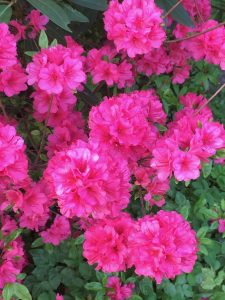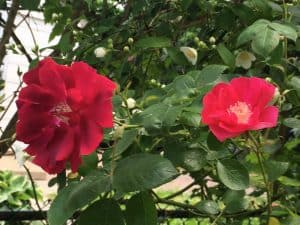by Gabrielle Kaplan-Mayer
There have been so many challenging things to cope with for all of us during the Covid-19 pandemic. While some days feel long and hard, I try to actively practice gratitude and counting all of my blessings. One of the blessings that I’ve appreciated since mid-March has been watching the seasons turn—how spring in the Northeast ushers in a symphony of flowers blooming: first daffodils and tulips, cherry blossoms, then azaleas and irises, now roses are blooming in my backyard and on the neighborhood streets where I walk.

My azaleas in bloom
It’s been a few years since my family planted a garden but we decided that this summer would be a perfect time for one. While there are so many things we can’t do—and my 14-year-old daughter is especially sad about not returning to camp—we’re focused on the Jewish value of pikuah nefesh (saving lives) and what unique things we can do to make summer 2020 feel full, certainly different, but not one where we dwell too much on what we’re missing.
I know not everyone has the outdoor space for a garden—and I hope that if you don’t have the ability to create a yard or patio garden that you can take these ideas and use them for indoor planting. Here are five reasons why spending time in your garden this summer is not only a fun, productive and delicious way to spend time—but also a very Jewish one:
Sh’mirat Ha’adamah: Sh’mirat Ha’adamah (protecting the earth) is an important Jewish value—and one that we can model for our kids and pass on to them when we spend time weeding, turning the earth, putting seeds or plants in the ground and taking care of them through the summer. This year through participating in a grant about planting native wildflowers through Ramah Day Camp, my family received beautiful violets and other plants to add to our backyard habitat. I had not realized before that replanting our lawns with native plants allows for essential wildlife habitat. Another mitzvah!
Our Jewish agricultural history: We recently celebrated the holiday of Shavuot, an important holiday with its roots in the Jewish people’s ancient agricultural history. While eating dairy on Shavuot has many different explanations, a number of scholars link the holiday to a time when farmers were harvesting certain cheeses and other dairy products in and around the land of Israel. When we don’t spend time connected to the cycle of planting and harvesting ourselves, it’s easy to feel disconnected from the agricultural roots of our tradition. Gardening with our kids can help them to awaken their curiosity and imagination about what harvest festivals were like in ancient times.
Connecting to our ancestors: To jump ahead a couple of thousand years…most of us are just a couple of generations removed from relatives who planted their own food out of necessity. My grandmother (who always planted a large vegetable garden) always told me stories about her immigrant mother kept a chicken coop out back of their little house in a small town neighborhood so that she could feed her kids with fresh eggs and slaughter the chickens herself according to the laws of kashrut. When the pandemic began and it was sometimes hard to get grocery deliveries, how I wished I was someone who had gotten interested in the new ‘old’ hobby of raising backyard chicken. Do you have stories from your grandparents or great-grandparents about them raising their own food? Now is a great time to share with your kids.
Slowing Down: Planting and tending a garden takes time—and teaches our kids a lot about patience. For the last few summers, I passed on creating a backyard garden because I knew I’d be busy out doing other things. While I look forward to a future summer when we can return to outdoor theater and concerts and can visit friends and family with no worries, I’ve also learned a lot about the value of slowing down and enjoying being at home. In our Jewish time, we have Shabbat every week to unplug, rest and reconnect with our family. I am enjoying gardening so much that I know now—even if next summer is busier outside of the home than this summer—that I will embrace the value of slowing down and make time to keep our garden going.
Eating! When my daughter planted her first tomato plant, we said a Shecheyanu, the Jewish blessing for firsts. And I can not wait to say it again when we find a ripe tomato on the plant and eat it. Eating together for Shabbat and holiday meals in another important part of our cultural tradition and how much sweeter when our kids feel the pride of eating food that they got to grow. And of course we can teach our kids the wonderful different blessings for the various kinds of fruits and vegetables we grow.
May your summer be full of special moments. I’d love to hear about your garden! Send me pictures. And at jkidphilly, we are always here to offer you resources and support.
Gabrielle Kaplan-Mayer is Chief Program Officer of Jewish Learning Venture. Here are her roses starting to bloom:





